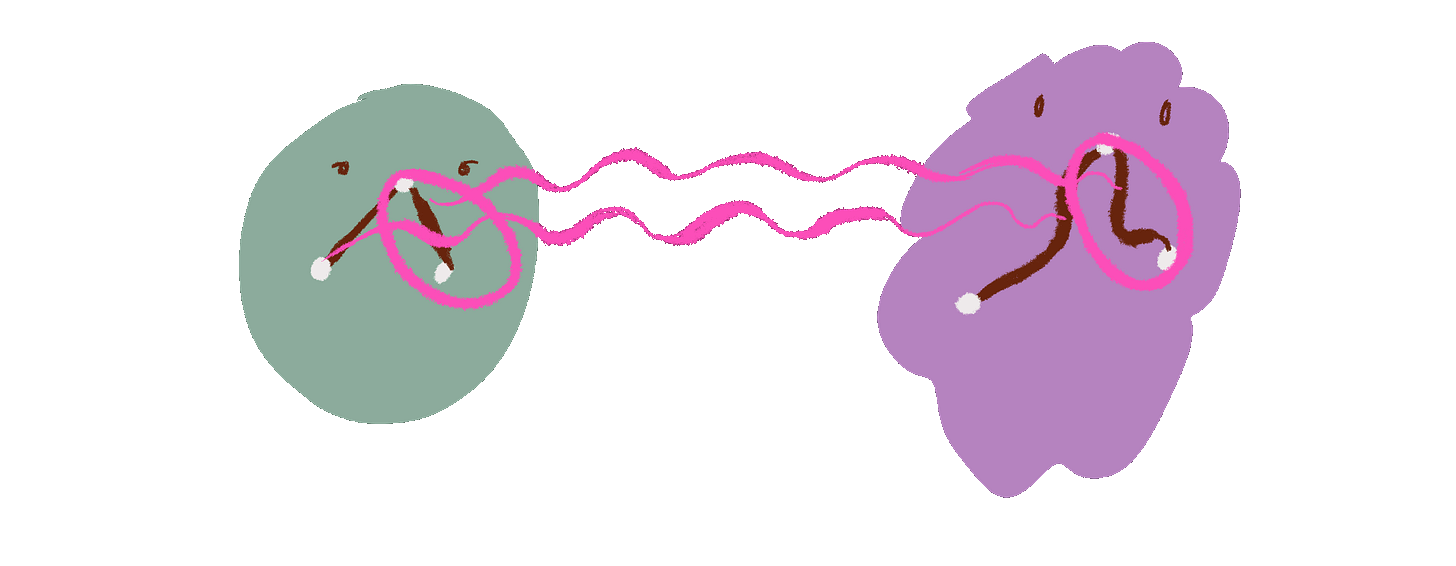“When you say you feel underutilized at work, could it be that what you want is love and belonging?“ — M observed near the end of our hologram call.
I cried upon hearing it.
“What made you cry?” Z asked.
Hmm…
Hard to answer. Sometimes I cry just because, but for this one I dug up some interesting data and hypotheses when I looked into my gut more.
The assessment rang true.
There suddenly was just one problem instead of many problems for what’s off about my current situation. And rather than a problem in how I am doing something wrong, it’s more of a goal state.
I had craved this goal state without knowing that I did. I thought the hunger was for chocolate or social media replies. I felt relieved and also nervous about having to face its completion now.
I want to exchange love and belonging with others in this world.
Homomorphism
In algebra, a HOMOMORPHISM is a structure-preserving map between two algebraic structures of the same type. The word homomorphism comes from the Ancient Greek language: ὁμός meaning "same" and μορφή meaning "form" or "shape". (Wikipedia)
In my head, homomorphism between me and other people is a loving emotion. As two sets of soul, body, mind… somehow we decoded the mapping between the most important relations and rules in our worlds, our spaces.
The translation is definitely a challenge — it requires effort, skill, and luck. But when you find that mapping: what a big relief.
What is important or interesting to you, it is interesting and important to me too. It exists in my world just in a different way. We are different, but we share similar problems and complementary solutions.
We can finally hug each other and reunite after getting birthed apart. All the unspeakable confusions are tolerable and adorable. We have infinite patience to explore and develop the uncertainties because either success or failure would be worth the effort. Now that I think about it, the effort itself is a prize for free.
(Shoutout to Leo for this word)
My bad
“MY BAD” is a colloquial way of admitting something is your fault. It’s a pick-up basketball slang popularized (but not first coined) by Manute Bol, a basketball player from Sudan playing with the Golden State Warriors, and subsequently adopted by teammates. (Wikitionary)
On the court I hear my teammates say “my bad” a lot a lot, whenever they miss a shot or mishears a call. It made me realize that I don’t say “my bad” as much in labs but I often feel it very intensely in my head.
I often feel bad for
not completing what I thought was expected of me. Revisiting previous working relationships, I feel not ready to talk to my previous mentors when I haven’t finished the analysis for those projects.
getting distracted by new ideas instead of completing team ideas through hard and boring work
my pleasure doesn’t contribute to others (I cope and enjoy myself through the process of creating but the products are not immediately beneficial to anyone else)
being born in a silver spoon but not using what was gifted to me for social good (There is a strong class filter because work gives money and other resources such as mentorship, information and community.)
being a parasite (?)
drenching in taking care of problems that appear unjustified in my internal world from overthinking or teenagering.
not obeying ideologies such as environmental sustainability or generosity to strangers
Upon hearing some of my worries about how I might make trouble to others (such as offending interview informants), a new friend I met in Yunnan, J, bulges her eyes and sucks a huge breath of air…
“that’s a lot bro”
Then she told me how she worried so much of the mistakes she made when she first started teaching, only to find that the students didn’t pay attention so it didn’t matter. We continued to interview and jam with the people we meet there with, on my end, a new sense of confidence that we will be equals.
Today I forgot to prepare food to take care of the embryos. My lab mentor noticed and I said “my bad”, which he acknowledges. I felt settled because we were on the same page and I knew approximately how to reduce the mistake — by keeping it in my notebook and checking with more experienced teammates whenever I am unsure.
I suspect this strategy is generalizable. The right problem is about the difference between the goal state and the current state. Previously I was bashing the current state is not helpful for reaching the goal state. Now that I sense my goal, I could look for effective strategies so to speak.
What does the goal state look like?
Love is a cuddle. Belonging is a farmland. I want love and belonging because I am a social and physical animal.
What are the obstacles?
I don’t see how much I have, how much I need, how I can get them.
How much do I have?
Upon more gut digging I see that I do have. There had been moments where I felt it with collaborators. Consultors. Mentors. Allies.
How much do I need?
Enough to not feel indebted to people who give me what I need.
How can I get love and belonging?
I know a constraint to start: Yesterday another friend from Yunnan who I don’t know well but feel weirdly resonant to, Lingmin, shared the chapter from a book about how some people follow the principle that they only take what is given to them, not more, even if they feel like they need or want more. So that’s one base rule.
I wish that loving (and loving through working) is playful and relieving. At least in its core. I can accept that storms and droughts come along with it if there is a celebration waiting in the beginning.





